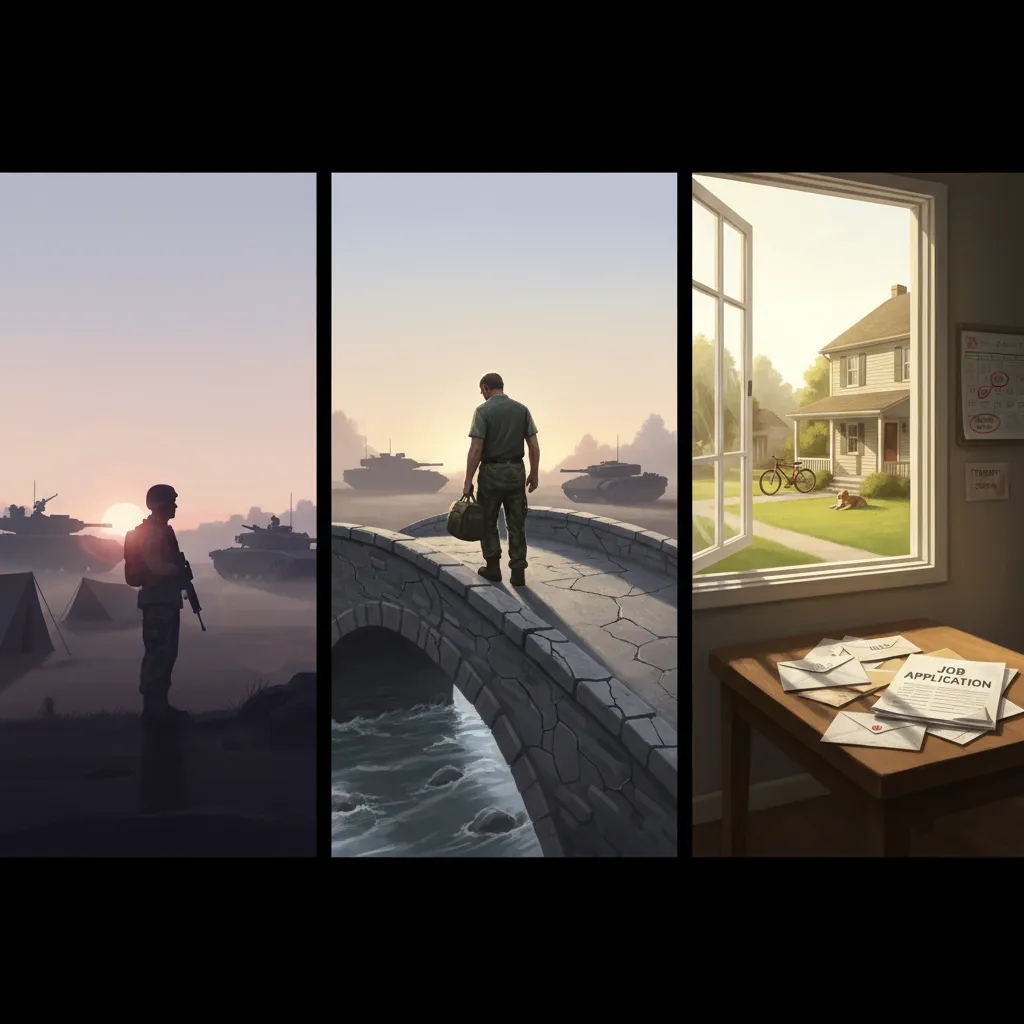Let me start with an honest admission: I used to dread Thanksgiving. Not because I dislike stuffing, but because the holiday was a harsh spotlight on everything I struggled with after military service. While my family talked football and cranberry sauce, my mind was stuck on bills, job rejections, and the silent ache of not belonging. Every year, I wondered: why did this all feel so much harder than what the training warned me about?
Why the Holidays Hit Different: The Hidden Strain of Civilian Life
“Thanksgiving is two days away. Most families are thinking about turkey, football... But many veterans are thinking, ‘How am I supposed to be grateful when everything feels this hard?’”
I remember one Thanksgiving after I got out. I was sitting at the table, faking a smile for my family, but inside, my mind was racing. I wasn’t thinking about the food or the game on TV—I was calculating bills, wondering how I’d stretch my next unemployment check, and feeling the weight of every rejection email in my inbox. That’s the hidden strain of civilian life for veterans. The transition challenges don’t pause for the holidays. In fact, they get louder.
Holidays like Thanksgiving are supposed to be about gratitude and togetherness. But for many veterans, they amplify feelings of loss, transition, and unfulfilled potential. Society expects us to show up, smile, and be thankful. But the internal battles—financial worries, career uncertainty, and the ache of missing purpose—aren’t visible to outsiders. The pressure to “feel grateful” when reality is overwhelming can make veterans feel even more isolated.
Military training prepared us for war, not for the emotional vacuum of civilian holidays. We were taught to complete missions, not to navigate awkward small talk or explain why we’re struggling to find work. When you look around the table and see everyone else laughing, it’s easy to compare yourself to “normal” civilians and feel like you’re falling behind. That sense of defeat or disconnection is real, and it’s one of the biggest civilian life struggles for veterans.
During family-centric times like Thanksgiving, the gap between what’s expected and what we actually feel can be huge. Veterans' transition challenges aren’t just about finding a job or a new routine—they’re about finding a sense of belonging and purpose in a world that doesn’t always understand. The emotional support for veterans is often missing, especially when the world assumes the hardest battles are behind us.
So if you’re sitting at the table this year, faking a smile and fighting back the feeling that you’re not where you should be, know this: you’re not alone. The holidays hit different for us because the struggle is invisible—but it’s very, very real.

From Battlefield to Bills: The Veteran Reality Nobody Talks About
When I first left the military, everyone told me the same thing: “You’ll be fine. Companies love veterans.” But the reality of the transition to civilian life hit me like a freight train. Instead of doors flying open, I faced a mountain of rejection emails. The promise of easy jobs turned into weeks—then months—of waiting, hoping, and watching my savings disappear. The numbers back it up: on average, it takes veterans around four months to find civilian employment, and about a third of us report serious challenges just landing a job.
What nobody talks about is how quickly the bills pile up. My unemployment checks barely covered gas, let alone rent and utilities. I remember one Thanksgiving where I could hardly afford a turkey. I sat at the table, trying to look grateful, but inside my head was a storm of worry—calculating which bill I could push off, wondering if the lights would stay on. That’s the part of veterans' transition challenges nobody prepares you for: the economic battlefield that starts the moment you hang up your uniform.
It’s not just about finding employment challenges. It’s about unmet needs at discharge—housing, healthcare, and finances. One-third of veterans leave service without these basics covered. The support is scattered, and the skills we learned in the military don’t always translate to resumes or interviews. Nobody teaches you how to market yourself, use AI, or build new income streams. Instead, you’re left feeling like you’re failing at something everyone said would be easy.
“Veterans aren’t failing. Veterans are underprepared for the economic battlefield we’re thrown into.”
Here’s the truth: the flaw isn’t in us. It’s in the system. We were trained for missions, not for marketing. We know how to follow orders, not how to build a business or personal brand. The civilian world runs on chaos, but we were built for structure. That’s why so many of us struggle—not because we lack skill or drive, but because nobody handed us a blueprint for this new fight.
The Shift: How a System Flipped My Thanksgiving from Dread to Hope
Last year, I hit a wall. I remember sitting on the edge of my bed, staring at the floor, wondering if civilian life ever actually gets better. The stress wasn’t just about money anymore—it was emotional. Every Thanksgiving, I felt like I was faking gratitude while my mind raced with worries. I missed the structure and mission of military life. I needed a plan, but I didn’t know where to start.
That’s when I discovered OfferLab for veterans. Let me be clear: this wasn’t some overnight fix or “magic-pill” program. OfferLab didn’t fix my life. OfferLab gave me the blueprint to fix my own. For the first time since leaving the service, I had a clear, step-by-step mission plan for veterans like me. It was a system that matched the way I was trained to operate—through structure, not guesswork.
The OfferLab framework pulled together everything I’d been missing:
Defining my mission—who I help and why
Identifying my audience and their real problems
Crafting a message that actually connects
Building offers that solve real needs
Learning how to automate and scale so I wasn’t chained to a screen
Suddenly, I had clarity. I had stability. I felt in control of my future again. The anxiety that used to cloud every holiday started to lift. Thanksgiving became a milestone for growth, not a day I dreaded. I could see progress—and for the first time, I felt hope.
Here’s what I learned: veteran empowerment through structure is real. Veterans thrive when we have a system. Once I restored that structure, my confidence and outcomes shifted dramatically. I wasn’t just surviving—I was building something. And it all started with having a plan.
OfferLab didn’t fix my life. OfferLab gave me the blueprint to fix my own.
If you’re a veteran struggling after service, know this: you’re not broken. You just need a system that gives you back your mission. That’s what changed everything for me.

Chaos vs. Clarity: Why the Civilian World Feels Like a Sitcom Without a Script
When I first made the transition to civilian life, it felt like stepping onto the set of a sitcom—except nobody handed me a script. Meetings about meetings, deadlines that shifted like sand, and supervisors who seemed more lost than a new recruit on day one. The civilian workforce is full of ambiguity. There’s no clear chain of command, no mission brief, and definitely no operational clarity. For veterans like us, used to structure and purpose, this chaos can feel overwhelming.
In the military, every day had a plan. You knew your objective, your role, and the steps to get there. That clarity was more than comforting—it was necessary. Suddenly, in the civilian world, I found myself surrounded by uncertainty. People quit because the coffee machine broke. Projects stalled because nobody wanted to make a decision. It was like watching a sitcom where everyone improvised, and I was the only one looking for the script.
Here’s the truth: We were built for structure. We were built for orders, objectives, and execution... OfferLab gave me something I didn’t realize I desperately needed: a civilian equivalent of an operational playbook. I realized that to thrive after service, I couldn’t wait for civilian systems to give me clarity. I had to engineer my own.
That’s where OfferLab came in. It became my operational playbook for civilian life—a repeatable system that replaced guesswork with clear steps. No more hoping the algorithm would “bless” me or that luck would finally turn my way. Success, I learned, is built, not hoped for. And building it requires a system, not just motivation or wishful thinking.
Embracing systems isn’t a detour from our military experience—it’s a natural extension. The veteran community thrives when we have support systems and resources that provide economic independence and direction. Civilian chaos doesn’t have to define our post-service lives. By proactively designing our own playbook, we regain the clarity and confidence that once made us effective in uniform.
Veteran resources like OfferLab bridge the gap between military order and civilian ambiguity, giving us the structure we crave and the progress we deserve. The sitcom may never have a script, but with the right system, you can write your own story—one mission at a time.
Gratitude on Hold: If You’re Still in the Fight, You Haven’t Lost
Let’s be honest holidays like Thanksgiving can hit different when you’re a veteran navigating the transition to civilian life. While everyone else is posting about gratitude, you might be sitting there thinking, “How am I supposed to feel thankful when every day feels like a new battle?” If that’s you, I want you to know that’s normal. Emotional support for veterans isn’t about forcing gratitude; it’s about recognizing the courage it takes just to keep showing up.
There’s a myth that if you’re struggling after service, you’re somehow failing. But the truth is, every struggle is proof you’re still in the arena. You’re not on the sidelines—you’re in the fight. And that’s something to respect. As I learned myself, overcoming post-service difficulties isn’t about pretending everything’s fine. It’s about persistence. It’s about seeking answers, even when you’re tired. It’s about taking one small step toward structure, even when the path isn’t clear.
“You don’t need to be grateful for struggle. You need to be grateful that you’re still in the fight.”
Most veterans need to hear this: you’re not stuck. You’re just one system away from major change. Early intervention and support can make all the difference—research shows that the sooner you get the right help, the more likely you are to thrive long-term. But even if you’re deep in the struggle, it’s not too late. Every small win—every call you make, every resource you try, every day you don’t give up—compounds over time.
Imagine this: what if one bold decision today could make next Thanksgiving unrecognizable? What if you could look back and see this moment as the turning point? That’s not just wishful thinking—it’s the power of structure and systems. Transition to civilian life isn’t about instant gratitude or forced positivity. It’s about building a foundation, step by step, until real gratitude has space to grow.
If you’re still showing up, you haven’t lost. You’re just getting started. And that’s something worth holding onto—especially when gratitude feels out of reach.

The Unfair Advantage: Why Veterans Make Systems Work (Even When Everything Else Feels Broken)
If there’s one thing I know for sure, it’s this: veterans have an unfair advantage when it comes to making systems work—especially when everything else feels broken. Our military training drilled into us the power of structure, routine, and mission-oriented action. We were taught to execute clear plans, adapt under pressure, and finish what we start. That’s why, when I finally found a civilian system that matched my drive—like OfferLab—it felt like coming home.
Here’s the truth: Veteran empowerment through structure isn’t just a catchy phrase. It’s reality. Most veterans aren’t “behind.” We’re not broken. We’re just not plugged into the right structure yet. The civilian world is chaos, but give a veteran a step-by-step blueprint, and watch what happens. We instinctively excel once we have a clear plan. That’s why OfferLab didn’t just bring me hope—it gave me direction, agency, and a sense of freedom I hadn’t felt since leaving service.
Restored confidence: Knowing exactly what to do next brings back the self-assurance you had in uniform.
Better income: Veteran financial stability strategies built into a system mean you’re not guessing anymore—you’re executing.
Family stability: When you’re not constantly stressed, your family feels it too. Peace at home starts with peace of mind.
Personal peace: Systems turn anxiety into action and action into results.
We have unique resilience and discipline. That’s our edge. When a veteran is handed a real system—one that leverages our veteran employment skills—everything changes. Each new level of organization builds toward a radically improved holiday season and everyday life. The mission becomes clear again, and the path forward is no longer a mystery.
Veterans don’t lack skill. We lack systems. Once you get a system—a real one—everything changes: your confidence, your income, your future.
With the right system, veterans convert military discipline into rapid civilian success and well-being, transforming not just holidays but their futures. Systematic approaches unlock old strengths and new results—financial, emotional, and relational. Veterans outperform when provided actionable frameworks. That’s the unfair advantage we carry—one system at a time.
Wild Cards: If Life Were a TV Episode, This Is the Plot Twist
Let’s play out a hypothetical: What if you approached your transition to civilian life like prepping for a field operation? Seriously—imagine you’re back at the briefing table, mission map in front of you, squad at your side. What would your mission plan look like? Would you just “wing it,” or would you break it down—objectives, resources, backup plans, supply routes, comms? That’s the mindset shift that changed everything for me: treating my civilian adaptation as a mission, not a mystery.
Here’s where the plot twist hit: The day I named my new “civilian mission,” everything clicked. My family noticed before I did. I wasn’t just drifting through job boards or faking smiles at Thanksgiving. I had a plan, and it showed. The stress didn’t disappear overnight, but for the first time since hanging up my uniform, I felt like I was back in command.
Here’s the unexpected truth: Civilian success isn’t about luck or “figuring it out as you go.” It’s more like running a base camp. You need order. You need supply lines. You need backup plans for when things go sideways. That’s why veteran transition challenges are so common—we’re dropped into chaos without a playbook. But a well-deployed system is the veteran’s secret weapon. Think of OfferLab as civilian logistics: a mission plan for veterans, built for the real world.
Sometimes I laugh imagining if the military handed out a “civilian playbook” at discharge. (Spoiler: they don’t.) But here’s the wild card—now, you can build your own. Systems like OfferLab give you the structure you were trained to thrive in. No more guessing. No more hoping. Just clear steps, like prepping for a field op.
So, here’s a question: If you could fast-forward to next Thanksgiving, what would future-you thank you for doing today? Would it be for stepping into a system that finally gave you clarity? For treating your transition to civilian life as the next big mission?
If you’re still showing up… you’re just one system away from a different life.
That’s the plot twist nobody warned you about—but it’s the one you get to write.
Conclusion: This Year, the Table Can Turn—And You Hold the Blueprint
Thanksgiving isn’t just about football, turkey, or who brings the best pie. For veterans, it’s a checkpoint—a moment to pause and reflect on where we are and where we want to go. If you’re feeling the weight of veterans' transition challenges or the sting of military-to-civilian life transition, know this: your current struggle doesn’t define your whole story. It’s just one chapter, not the ending.
I’ve learned firsthand that freedom and stability in civilian life don’t come from random tactics or bursts of motivation. They come from systems—clear, structured paths that turn chaos into confidence. When I found a real system, everything changed. Suddenly, the anxiety around holidays, bills, and the future started to fade. I realized that veteran unemployment solutions aren’t about luck or waiting for someone else to hand you an opportunity. They’re about taking the blueprint and building your own mission plan, just like we did in uniform.
This Thanksgiving, whether you feel hopeful or heavy, remember you’re never more than one system away from a new chapter. You’re wired for mission success. You just need the right map. And the choices you make today—no matter how small—can make next year unrecognizable in all the right ways. The journey from struggle to stability is both collective and personal. We’re in this together, but you hold the pen to your next chapter.
So, as you sit at the table this year, know that your struggle doesn’t disqualify you. In fact, it’s proof you’re still in the fight. With the right system, you can find gratitude and stability—not just for yourself, but for your family and future. You can redefine what holidays mean, turning them from reminders of stress into milestones of progress.
Next Thanksgiving can look completely different. You’re closer to freedom than you think.
This year, let Thanksgiving be more than a meal. Let it be the moment you decide to turn the table—and build the life you deserve, one system at a time.



